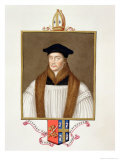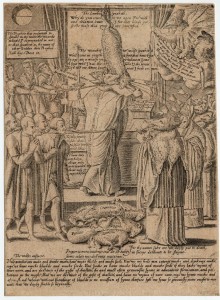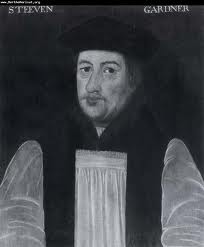Defining terms: Gardiner’s Theology of the Supremacy

none of the portraits of Gardiner are particularly well drawn. This one belongs to Countess of Essex
De Vere Obedentia is much more than a clever piece of rhetoric – although there is plenty of rhetorical argument contained therein. It was written between 1534 and 1535 and was published in September 1535. J.A Muller – Stephen Gardiner and the Tudor Reaction still provides the most lucid précis:
To obey truly is to obey truth. God is truth. Therefore true obedience is obedience to God and to whom God appoints to represent him. The Bible which is the true word of God recognises king’s as God’s representative on earth. Hence the king should be in matters of religion as well as in matters secular. This is also in accord with reason for the people who compose church are the same as those who compose the realm; and to deny the king’s authority over them in one capacity and not in the other is an absurdity. Further, scripture sets no limits whatever on the subject’s obedience to the king. If royal commands are contrary to God’s will it is the king giving them, not the subject obeying them, who will be judged of God. (Muller op cit.p.61)
The argument is cogent; the style combative and the treatise is, as Muller shrewdly observes almost, composed as if it is designed as much to persuade the writer as much as the reader. And indeed so it should have been because it was written in the shadow of the very laws which erected a jurisdictional novelty into the body of the English church and which any English bishop now had to find good reasons to accept in order to have better reason to obey. This new situation needed some explaining. And Gardiner gives the reader his explanation with some considerable relish.
Gardiner appeals to history; to common sense; to scripture; to St Paul; to the practice of the early church: he cites the powers of the kings of the Old Testament; the precedents of the Christian Roman emperors – more Justinian than Constantine – and he also appeals to the example of the early English kings – saints and scholars – which particularly chimes with the official peels established within the royal closet; in the wider court and with the prejudices of the educated Humanist elite beyond.
These are obvious arguments in their way but Bishop Gardiner gives them new employment with the cause of a new, royal, master; and not only to they serve their rhetorical purpose better than before Gardiner cleverly simultaneously makes them serve another purpose entirely. Effectively using Christ’s admonition to render those things unto Caesar that belong to Caesar, Gardiner vehemently argues –
For what is consequency then? Christ would have Peter to be above princes as it appeareth it was never in his mind….(Ibid. p. 84)

The English Reformation became deeply personalised and vicious. This allegorical satire of Gardiner & the Mass makes the point well
Gardiner is at his most persuasive in his attacks on the Petrine doctrine as the basis of a papal Supremacy. He demonstrates that the primacy Peter exercised was never exclusive. He cleverly points out that Christ never claimed any temporal supremacy and therefore would not have bestowed it upon Peter or any of the Apostles. The powers he gave “feed my lambs; feed my sheep” and “what you loose on earth is loosed in heaven” are spiritual. He points out that St Paul was clear about the duty of the servant to the master was as wife to husband. He points out that St Paul too addressed and directed the Romans in his Epistles whilst St Peter was yet Bishop of Rome and that Peter, John and James in many eyes shared co-primacy, continuing:
In Scriptures there is no mention of Peter’s supremacy and Eusebius in Ecclesiastica Historia reporteth that Clemens in Sexto Li. dispositonium affirmed that Peter, John and James after the ascension of our Saviour, although he had set them above all the apostles yet they took not the glory of supremacy upon them but that James, which is called Justus, was ordained the bishop of the apostles. Notwithstanding for the authority’s sake of them I do not so much refuse the word self, but I flee the interpretation of the word that it may agree with the right proper meaning of the Gospel expressed in Christ’s deeds. ( De Vere Obedentia, Longmans, (1870) p. 86)
Whatever these arguments lacked in doctrinal refinement they still pack a pretty large logical and theological punch. And in his time; in his age; in the courts of these great kings of the early modern monarchies, many agreed with scriptural thrust of Gardiner’s arguments. They carried weight, not least because they ran with the grain of educated opinion, informed, as it was, largely by classical philosophy preserved in the works of Roman authors – another cultural elite with whom these early modern elitists shared so many values and prejudices; a secular philosophy, insofar as it was pre-Christian, that was nevertheless taught as if it was another branch of the gospel truth…….continued here

